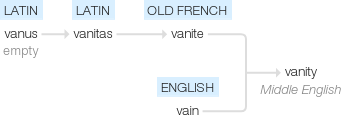Vanity
来自Big Physics
Safin(讨论 | 贡献)2022年4月27日 (三) 07:13的版本 (建立内容为“Category:etymology == google == [https://www.google.com.hk/search?q=vanity+etymology&newwindow=1&hl=en ref] Middle English: from Old French vanite, from Lati…”的新页面)
Middle English: from Old French vanite, from Latin vanitas, from vanus ‘empty’ (see vain).
wiktionary
va(i)n + -ity, from Middle English vanite, from Old French vanité, from Latin vānitas, from vānus, whence English vain. Doublet of vanitas.
etymonline
vanity (n.)
c. 1200, "that which is vain, futile, or worthless," from Old French vanite "self-conceit; futility; lack of resolve" (12c.), from Latin vanitatem (nominative vanitas) "emptiness, aimlessness; falsity," figuratively "vainglory, foolish pride," from vanus "empty, void," figuratively "idle, fruitless," from PIE *wano-, suffixed form of root *eue- "to leave, abandon, give out." Meaning "self-conceited" in English is attested from mid-14c. Vanity table is attested from 1936. Vanity Fair is from "Pilgrim's Progress" (1678).
